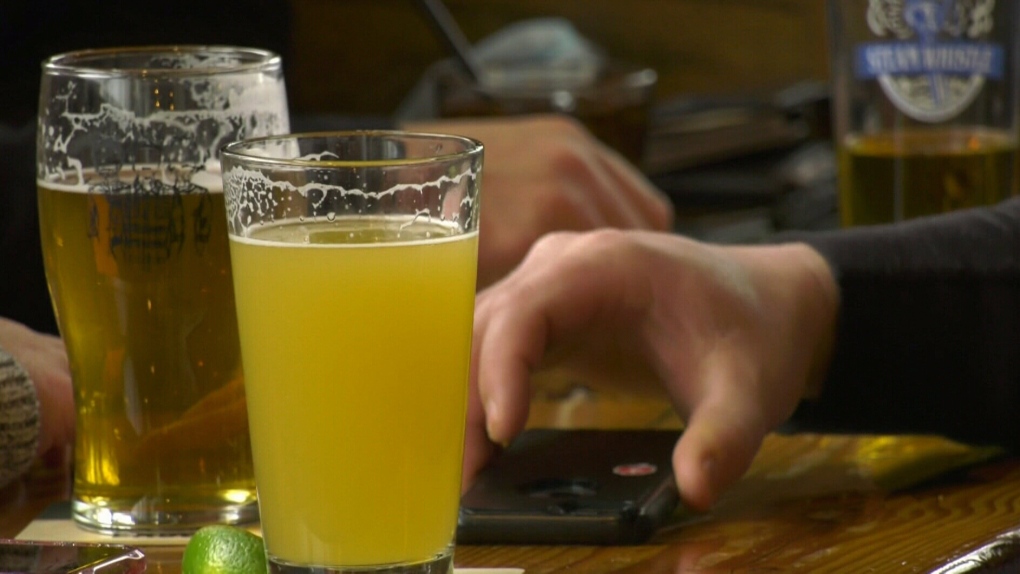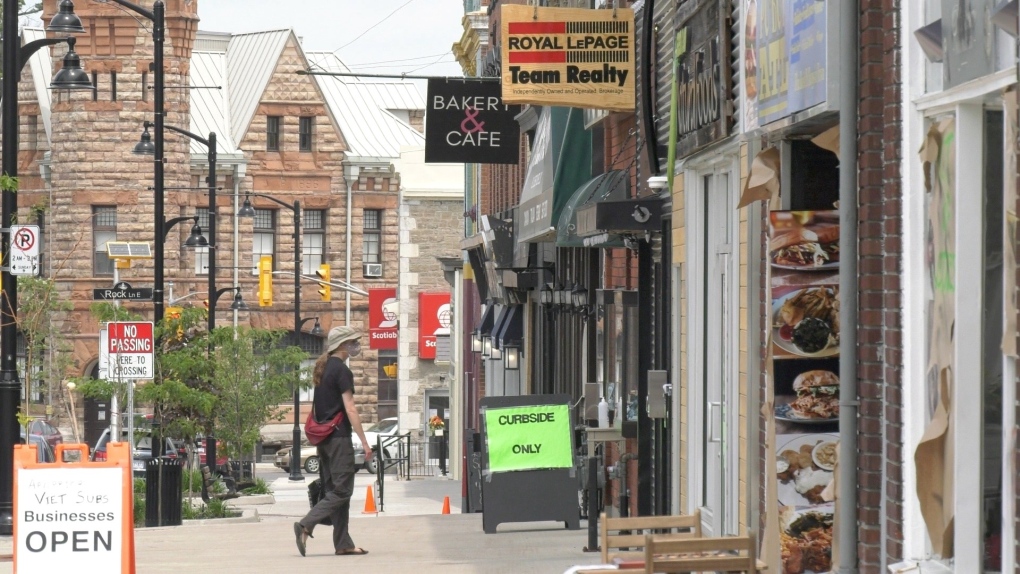COVID-19 in Ottawa: Fast Facts for June 9, 2021
 People relax along the shores of the Ottawa River, as a heat warning is in effect for the region with expected daytime high temperatures of 31 to 33 degrees C, in Ottawa on Sunday, June 6, 2021. (Justin Tang/THE CANADIAN PRESS)
People relax along the shores of the Ottawa River, as a heat warning is in effect for the region with expected daytime high temperatures of 31 to 33 degrees C, in Ottawa on Sunday, June 6, 2021. (Justin Tang/THE CANADIAN PRESS)
Good morning. Here is the latest news on COVID-19 and its impact on Ottawa.
Fast Facts:
- Ottawa Public Health reported another new low in daily COVID-19 cases on Tuesday.
- The Quebec government has announced that the Outaouais region will see restrictions eased even more this coming Monday.
- New analysis from the Ontario COVID-19 science table suggests Ontario students are three months behind in their learning because of repeated school closures.
- COVID-19 rapid test kits are now available to local businesses in the Ottawa Valley
COVID-19 by the numbers in Ottawa (Ottawa Public Health data):
- New COVID-19 cases: 15 cases on Tuesday
- Total COVID-19 cases: 27,335
- COVID-19 cases per 100,000 (previous seven days): 26.8
- Positivity rate in Ottawa: 3.3 per cent (May 31 to June 6)
- Reproduction Number: 0.93 (seven day average)
Testing:
Who should get a test?
Ottawa Public Health says you can get a COVID-19 test at an assessment centre, care clinic, or community testing site if any of the following apply to you:
- You are showing COVID-19 symptoms;
- You have been exposed to a confirmed case of the virus, as informed by Ottawa Public Health or exposure notification through the COVID Alert app;
- You are a resident or work in a setting that has a COVID-19 outbreak, as identified and informed by Ottawa Public Health;
- You are a resident, a worker or a visitor to long-term care, retirement homes, homeless shelters or other congregate settings (for example: group homes, community supported living, disability-specific communities or congregate settings, short-term rehab, hospices and other shelters);
- You are a person who identifies as First Nations, Inuit or Métis;
- You are a person travelling to work in a remote First Nations, Inuit or Métis community;
- You received a preliminary positive result through rapid testing;
- You require testing 72 hours before a scheduled (non-urgent or emergent) surgery (as recommended by your health care provider);
- You are a patient and/or their 1 accompanying escort travelling out of country for medical treatment;
- You are an international student that has passed their 14-day quarantine period;
- You are a farm worker;
- You are an educator who cannot access pharmacy-testing; or
- You are in a targeted testing group as outlined in guidance from the Chief Medical Officer of Health.
Where to get tested for COVID-19 in Ottawa:
There are several sites for COVID-19 testing in Ottawa. To book an appointment, visit https://www.ottawapublichealth.ca/en/shared-content/assessment-centres.aspx
- The Brewer Ottawa Hospital/CHEO Assessment Centre: Open Monday to Friday 10 a.m. to 5:30 p.m. Saturday and Sunday 8:30 a.m. to 3:30 p.m.
- COVID-19 Drive-Thru Assessment Centre at 300 Coventry Road: Open seven days a week from 10 a.m. to 6 p.m.
- The Moodie Care and Testing Centre: Open Monday to Friday from 8 a.m. to 3:30 p.m.
- The Heron Care and Testing Centre: Open Monday to Friday from 8 a.m. to 4 p.m.
- The Ray Friel Care and Testing Centre: Open Monday to Friday from 8 a.m. to 4 p.m.
- North Grenville COVID-19 Assessment Centre (Kemptville) – 15 Campus Drive: Open Monday to Friday 9 a.m. to 5 p.m. Sunday from 9 a.m. to 1 p.m.
- Centretown Community Health Centre: Open Monday, Tuesday, Wednesday, Friday from 9 a.m. to 4 p.m.
- Sandy Hill Community Health Centre: Open Monday to Friday from 9 a.m. to 3 pm.
- Somerset West Community Health Centre: Open from 9 a.m. to 4 p.m. Monday to Wednesday, 1 p.m. to 4 p.m. Thursday and 9 a.m. to 2:30 p.m. on Friday
COVID-19 screening tool:
The COVID-19 screening tool for students heading back to in-person classes can be found here.
Symptoms:
Classic Symptoms: fever, new or worsening cough, shortness of breath
Other symptoms: sore throat, difficulty swallowing, new loss of taste or smell, nausea, vomiting, diarrhea, abdominal pain, pneumonia, new or unexplained runny nose or nasal congestion
Less common symptoms: unexplained fatigue, muscle aches, headache, delirium, chills, red/inflamed eyes, croup,
OPH reports new 2021 low for daily COVID-19 cases
Ottawa Public Health said Tuesday that 15 more people in the city tested positive for COVID-19, the lowest daily case count since mid-December.
There were 13 new cases reported on Dec. 15, 2020.
This came as the province sees fewer than 500 new cases for the first time in eight months, with 469 newly confirmed infections.
No new deaths were reported in Ottawa on Tuesday.
Across eastern Ontario, Public Health Ontario reported just one new case outside of Ottawa in the Renfrew County and District Public Health Unit.
Outaouais moves to yellow zone on June 14
Residents of Gatineau and the rest of the Outaouais will be able to have visitors over to their homes and can return to bars and casinos as of Monday, under Quebec's reopening plan.
The Outaouais region is one of 10 Quebec regions moving to the province's Level 2 or "yellow zone" on June 14.
Under the yellow zone, indoor gatherings are no longer prohibited but are limited to the occupants of two households. A maximum of eight people from different households or all occupants from two households are allowed to gather outdoors.
Bars and casinos can open and so can amusement and water parks.
The border between Ontario and Quebec remains closed to non-essential travel.

New analysis suggests Ontario students are about three months behind on their learning because of school closures
New analysis backs up what many parents have said for months — that Ontario students, who are losing in-class learning, have fallen behind.
Ontario public school students are likely two to three months behind in their learning because of school closures brought on by COVID-19, leading to life-long losses in their expected earnings as adults if efforts aren’t made to bring them up to speed, a new analysis by the COVID-19 Science Table said.
The research shows that there will be long-term impacts on children.
“Long-term effects on economic mobility, on the children’s own development, on the students’ own skills and learning, and all of this is going to have negative affects not only on their wellbeing, but also on their life opportunities,” says Srivastava.
It’s impossible to gain back lost time, but the science table says schools can close the learning gap in the years ahead with more instruction, and additional money invested among other recommendations.
 Mother and daughter sit in front of a blank computer screen. (August de Richelieu/Pexels)
Mother and daughter sit in front of a blank computer screen. (August de Richelieu/Pexels)
Free COVID-19 rapid tests available to small- and medium-sized businesses in the Ottawa Valley
Businesses in the Ottawa Valley are set to receive a helpful tool as they work towards reopening.
COVID-19 rapid testing kits are being made available to small and medium-sized businesses by the Greater Arnprior, Renfrew & Area, and Upper Ottawa Valley Chambers of Commerce.
The tests are free of charge and will be made available to any business with 150 or fewer employees that wants them. Delaney says the nose-swabbing tests are less invasive than some other tests and yield results within twenty minutes.
The Greater Arnprior Chamber of Commerce says they are hoping employees will test themselves on average twice per week, and expects shipments of the tests to go out by the end of June.
 A photo of downtown Arnprior. (Dylan Dyson / CTV News Ottawa)
A photo of downtown Arnprior. (Dylan Dyson / CTV News Ottawa)
CTVNews.ca Top Stories

In Pictures Jake Paul beats 58-year-old Mike Tyson as the hits don't match the hype
The boos from a crowd wanting more action were growing again when Jake Paul dropped his gloves before the final bell, and bowed toward 58-year-old Mike Tyson.
Montreal city councillors table motion to declare state of emergency on homelessness
A pair of independent Montreal city councillors have tabled a motion to get the city to declare a state of emergency on homelessness next week.
Canadians support bike infrastructure, just not the road: study
A new Nanos Research study reveals that a majority of Canadians support spending tax dollars on building bicycle infrastructure off the road, but that bike lanes on roads worsen traffic flow.
WestJet passengers can submit claims now in $12.5M class-action case over baggage fees
Some travellers who checked baggage on certain WestJet flights between 2014 and 2019 may now claim their share of a class-action settlement approved by the British Columbia Supreme Court last month and valued at $12.5 million.
Turtle plush toys recalled due to choking hazard: Health Canada
Health Canada announced a consumer product recall this week for a plush children’s toy, due to a potential choking hazard from the eyes of the toy detaching.
U.S. health officials report first case of new form of mpox in a traveler
Health officials said Saturday they have confirmed the first U.S. case of a new form of mpox that was first seen in eastern Congo.
Former soldier 'Canadian Dave' taken by the Taliban: sources
David Lavery, a former Canadian Forces soldier who helped approximately 100 people flee Afghanistan during the fall of Kabul, has been 'picked up' by the Taliban this week, according to multiple sources who spoke to CTV National News on the condition of anonymity.
NYC politicians call on Whoopi Goldberg to apologize for saying bakery denied order over politics
New York City politicians are calling on Whoopi Goldberg to apologize for suggesting that a local bakery declined a birthday order because of politics.
Trudeau talking trade with South American leaders at APEC in Peru, will address media
Prime Minister Justin Trudeau is meeting with South American leaders in Peru today, in his second day at the Asia-Pacific Economic Cooperation summit.
































